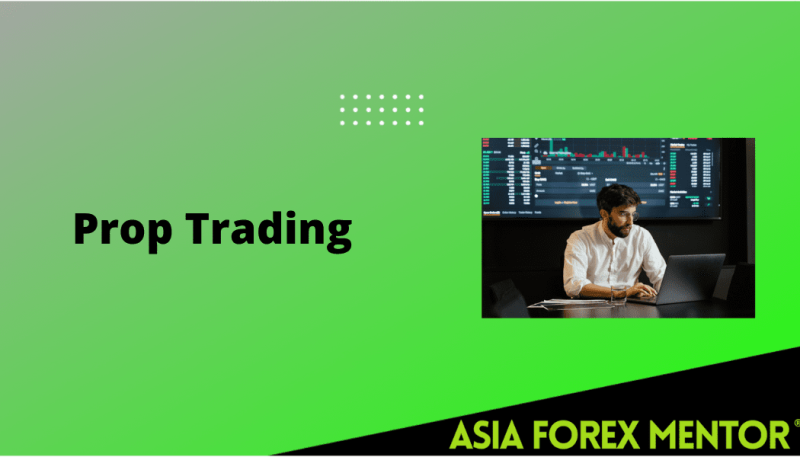
A term that’s often tossed around in the financial realm is prop trading. People will often claim that it’s one of the most rewarding things one can engage in, but what exactly is it? Well, that’s precisely what we intend to answer and delve into today.
In this article, we’ll break down what proprietary trading is, how it works, its benefits, downsides, and even how it compares to hedge funds. And if you’re considering joining a prop trading firm as a trader, we’ve also included a detailed guide on how you can join one and things you’ll need to consider before getting started to ensure a pleasant experience.
Also Read: What is Spot Trading and How To Trade Spot Markets?
Contents
- What Is Prop Trading?
- How Can One Become a Funded Prop Trader
- Benefits of Proprietary Trading
- 7 Things to Consider Before Becoming a Trader for a Proprietary Trading Firm
- Conclusion
What Is Prop Trading?

Prop trading refers to where a company (a prop trading firm) hires 3rd parties (skilled prop traders) who will trade their own capital. These proprietary trading firms allocate risk capital to these top traders, and in return for their services, these traders are awarded a portion of the profit.
Usually, the prop trading firms offer a profit split percentage of between 25 and 50 percent, although some prop firms will have higher profit distributions of up to 75 percent. Some top proprietary trading firms will even pay their serious traders a minimum monthly salary, which allows these traders to focus solely on attaining the best trading results
What’s more? Strategies used by these proprietary traders to maximize returns include volatility arbitrage, global macro-trading, index arbitrage, and merger arbitrage. The prop trading firms provide an even better edge to these traders in the form of pools of information, complex trading instruments, and sophisticated software, all of which allow prop traders to make critical, educated decisions.
Also worth noting, these prop companies do not use their clients’ money. The traders use the firm’s capital to trade forex markets, stocks, bonds, commodities, derivatives, and other financial instruments. This, in turn, enables the prop trading firm to earn full profits from its trades instead of just commissions they’d usually receive after processing trades for clients.
How Can One Become a Funded Prop Trader

Getting into prop trading is easier and more affordable now than ever. Proprietary trading firms worldwide offer their services online and are always trying to find skilled traders who can trade remotely from wherever they live.
To become one of these proprietary forex traders, you’ll need to go through a funded trader program by filling out a form and informing the prop trading firm of your trading experience, education level, and background.
Depending on the funding program options you’ve picked and the prop trading firm you’d like to work with, you may also have to go through an interview and evaluation process where you’ll discuss your trading skills, experience in the financial markets, the markets you’d prefer to trade, your trading style, risk management rules, and the trading strategies you plan on using.
Here is a typical rundown of the steps a prop firm will go through to identify skilled traders for their program:
- Step one, the day traders pay a nominal audition fee
- Step two, the traders undergo a “challenge” and “evaluation process”
- Step three, the experienced traders pass the challenge
- Step four, each of these successful traders receives a live-funded account. Here, the traders are also refunded the audition fee they paid as they start trading.
- Lastly, if they’re able to use these funded accounts to trade profitably, the traders receive a profit split of any realized gains
Also, note that most prop companies have a two-phase evaluation period. This implies that once a trader has completed an application process successfully and joined the prop trading company’s prop trading team, they have to enter a second evaluation period. This usually lasts between 30 and 60 days on most proprietary trading firms.
During this period, the traders must prove their ability to consistently generate profits using their funded account and meet the prop trading firm’s company requirements before proceeding to the next level. The “next level” usually involves less oversight, 24/7 access to a support team, instant funding, very relaxed trading rules, and the room to exercise one’s trading plan and manage risk however one sees fit.
As you can see, unlike a hedge fund or investment banking firm, the best prop trading firms are all-inclusive. You can quickly build a career selling and buying financial instruments if you’re a professional trader with a successful trading journey and a proven track record. Pass the low entry-cost challenge, and you’re in.
Another fitting question I think I should address in this section of the guide is, “How much do prop traders make?” That’s the big question, after all, right? Well, salaries for these experienced traders will vary from nation to nation and will also depend on the trader’s performance and their minimum trading days.
So, since these traders get a profit split of anything they’ve earned, they theoretically have unlimited profit potential. According to ZipRecruiter, the average proprietary trader’s salary stands at approx. $90,566 per year. According to Comparably, wages for these traders in the US range between $42,373 and $793,331, the average being $203,679.
Benefits of Proprietary Trading

This article section will focus on the benefits of proprietary trading for both prop trading firms and traders.
The first of these benefits of proprietary trading is it maximizes profits for prop companies. As we noted earlier, unlike when they’re acting as retail brokers and only earning commissions, these firms enjoy 100 percent of the profits from prop trading.
Another essential benefit of prop trading is that a prop firm can stock inventories of securities for future use. When a firm purchases securities for purely speculative purposes, they stand a chance to sell them later to clients who may desire to buy them.
These firms can also loan out their securities to clients who desire to sell short.
The third advantage of prop trading is it gives the best proprietary trading firms a shot at engaging in market making. Firms and corporations in financial domains generally tend to have competitive advantages over the retail investor segment.
They not only possess significantly larger investment capitals but also have better, faster access to price-sensitive, high-level information that they tend to use to their advantage. In the end, all this allows prop companies to enjoy higher returns rates than if they had invested in a different market environment, think term deposits and bonds.
Still, under market making, prop companies that deal with specific kinds of financial securities provide liquidity for investors in said securities. A proprietary firm can buy these securities using its own resources, then sell them to interested investors at future dates. Note, however, that this can also be a downside.
If a proprietary trading firm purchases securities in bulk but they become worthless, the firm has to absorb all these losses internally. These firms only benefit if the security’s price rises or others agree to buy them at higher prices.
For traders, the first benefit of joining a prop trading team gives them access to sophisticated automated software and other trading algorithms or technology.
These sophisticated electronic resources, in turn, award traders access to a wide range of markets and the ability to not only automate their trading activity but also engage in high-frequency trading. The traders can develop a trading idea, develop trading rules, test its viability, and run demos on their computers without a hassle.
Are you wondering why prop traders must join prop trading firms to enjoy these trading tools? Well, with most proprietary trading companies, the tools and trading parameters used are exclusively in-house and can only be used by traders who accept to join the firms’ prop trading team.
Also, to fully comprehend the benefits of prop trading, you’ll also need to understand the difference between hedge funds and prop trading firms. Unlike prop companies, hedge funds invest money belonging to their clients.
Furthermore, hedge funds are answerable to their clients, unlike proprietary companies. This often implies that they cannot take more risks and have a broader profit target like prop companies. That said, a hedge fund, like a prop company, can be a market maker.
Also Read: The 5 ers Review: The Best Forex Prop Trading Firm in 2023
7 Things to Consider Before Becoming a Trader for a Proprietary Trading Firm

If you’re confident in your trading expertise and have a trading strategy (or several) that you think would allow you to succeed in prop trading, consider the following factors before committing to any firm in particular.
-
Credibility
First and foremost, ensure the prop trading firm you’re about to work with has a positive reputation and good user reviews. Visit the firm’s website and check its terms & conditions page and its trading agreement. We’d also recommend looking at additional forums like TrustPilot to see what others say about the company or its services.
-
Basic Income
As earlier mentioned, top proprietary trading firms will offer their traders a base monthly salary in addition to the monthly or weekly profit split. Note, however, that while these amounts can be relatively low, they can still affect your profit split agreement. The salary will, however, cover your base salary and allow you to worry less as you strive to trade successfully.
Unfortunately, it’s still extremely unlikely to find remote prop trading firms that offer base salaries. So, suppose you insist on trading for a company that provides you with a stable income. In that case, you may have to join one of the biggest prop firms accessible to you in the industry and stick with the traditional way of going to an office and working alongside other managers and traders.
-
Scaling Plan
Prop trading companies will usually offer scaling plans that allow their most successful traders to grow and increase their account limits as well as profit targets. For instance, assume that a prop company offers all its successful applicants an initial account size of $100,000.
If any of the applicants succeed in finishing all evaluation processes and demonstrate a great understanding of the financial markets, the prop company can then graduate the trader to the next level with a larger account size, say $200,000.
-
Trading Fees
Another essential factor you’ll need to consider before joining a prop trading firm is the trading costs and fees the company charges its traders. Trading fees, in particular, are a massive deal for traders who tend to make upwards of 100 – 500 transactions in a single trading day.
In some scenarios, traders will even have a winning trading day but will end the day with losses due to the trading fees they’ll be required to pay by the company. To avoid surprises, ask the firm you’re about to join about their platform fees beforehand.
We’d even recommend going as far as asking about any trading fees associated with the financial instruments you’ll be trading, as well as if there exists any hidden costs or expenses that aren’t apparent upfront (think withdrawal fees, etc.) Additionally, you can ask the firm if they have any rebate trading program.
-
Risk Management and Trading Guideline Rules
Prop trading companies have different risk management and trading guideline rules. These will often include trade restrictions per asset or market, daily & overall profit target levels, maximum transactions that can be executed in a day, overall drawdowns, maximum daily drawdowns allowed per day (the daily stop-loss), minimum or maximum trading days, and many more.
If you’re an experienced trader, then carefully analyzing these risk management and trading guideline rules to determine whether or not they match your trading strategy shouldn’t be a hassle. And if you’re a novice trader, we advise that you reach out to traders who already use the prop firm’s services and confirm that new traders can make profits in light of the company’s terms and conditions.
-
Profit Split
The main thing any prospective prop trader is curious about is usually the profit split percentage. Most firms in the industry offer their clients 50% – 50% profit splits. Some of them will offer their most successful trader even higher profit share percentages of up to 75 percent.
Above 70 is the ideal profit split rate you should look forward to receiving when dealing with a funded trading account.
-
The Monthly Fee
It’s a standard for most prop companies to charge their traders monthly fees for their funded trading accounts. This is only fair, considering that the prop firm is taking the biggest risk by allowing traders to use their capital. These monthly fees help balance that risk.
What’s the fee? Typically, the monthly payment on a high-end trading platform will be $100 – $150 a month for access to the financial company’s capital and even access to its platform and real-time trading data. Some of these platforms will also charge one-time payments that range between $500 and $1000.
Conclusion
We hope this guide has successfully explained why prop trading is an excellent career starter for anyone interested in finance and the financial market. When working with a good firm, you’ll be able to trade a wide range of assets (like exchange-traded funds, commodities, currencies, and stocks), all without risking a substantial amount of your own money.













